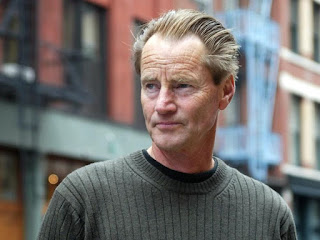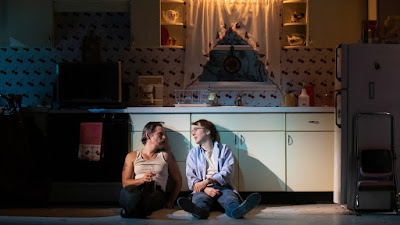Theater Review: Sam Shepard’s True West: Real Men from Another Era (or Planet)
True West
By Sam Shepard
Starring Ethan Hawke and Paul Dano
Directed by James MacDonald
American Airlines Theater, Manhattan
January 27, 2019
This excellent production of Sam Shepard’s 1980 drama True West was jolting, and reminded me
of how much society has changed in 40 years. Seeing Ethan Hawke and Paul Dano
assault each other’s egos, strut their masculinity, and neglect, demean, or
lust after their women felt like some sort of time capsule from an era when men
were men, women were women, and vive la
différence. We now live in an
era where blandly reassuring young men in TV commercials are fussing over the
kids, where transgenderism (either real or affected), is all the rage, and
where “male aggression” is pretty much a felony. And, by the way, where women
are not so marginalized, typecast, and condescended to as they were in the
past. Well, that was not Sam Shepard’s world in 1980. Shepard (1943-2017) wrote
44 plays, won a Pulitzer for one (Buried
Child) and acted in numerous films including the testosterone-rich astronaut
movie The Right Stuff, playing the
most manly man of all the flyers, Chuck Yeager. Shepard’s men are tough,
challenged, and often falling on hard times. There are often themes of resentment,
emasculation and de-masculation (by women). His men and women are always
different and are often adversaries. I suspect Shepard was incredulous about our
gender-blending millennial era in the years before his death.
True West is a
classic work of this playwright. It deals with two brothers, the “good one”
Austin (Paul Dano from There will be
Blood, Little Miss Sunshine), and the “bad one” Lee (Ethan Hawke of Gattica and About Last Night) who meet at their vacationing mother’s home in
the Los Angeles area. Austin, a frustrated writer, is attempting to finish and
negotiate a deal with a producer on his screenplay (a tepid romance). He’s also charged with watering his mother’s
plants (they die due to inattention, BTW, a nice metaphor for self-centered men).
His brother Lee wanders into the house from his vagabond lifestyle of appliance
burglary in the desert, wanting money and companionship. Act 1 mostly consists
of Lee taunting, provoking, and enraging the intellectual, seemingly placid
Austin about his lack of manhood and sense of adventure. The play turns when Austin’s
producer plays golf with rogue brother Lee, who somehow sells the producer on his prospective screenplay about Texans
chasing each other in the desert. Now Austin is enlisted to help his degenerate
brother Lee on his project. This is too much for poor Austin’s ego, and Act 2 flips
the scenario with Lee trying to be responsible and complete his screenplay, with
Austin running amok and literally trashing the stage. So men are all alike, the
playwright suggests. But both characters have their lovable side, and neither character
becomes truly repellant. In the end their future success in “finding themselves”
is implied, if not explicated. I think that Shepard implies that we should
appreciate these “Neanderthal” qualities in men a bit, not just eradicate them,
since these qualities are one way men work out their issues.
The play gives both lead characters a chance to strut their
dramatic range, from psychosis to insecurity to bravado. Ethan Hawke dominates Act
1 with his characteristic smirking, sneering (yet vulnerable) performance. He
has always done well in roles that ask him to uncomfortably veer between
masculinity and modern sensitive male roles (e.g. the About Last Night series or the father in Boyhood), so this role seemed written for him. Dano was also
perfect. His Act 1 blandness and timidity progressed into a copy of his brother’s
braggadocio and taunting in Act 2. The fireworks on stage were adeptly paced by
experienced stage director James MacDonald. He did a nice job of letting the
stars have their virtuosic turns, yet keeping our attention focused on the play
itself, and the issues it raised. The set was a dowdy 1970’s kitchen with formica
and flowery wallpaper (it was their mother’s house, remember), an ironic
setting for the male strutting on display.
One message of the play is that men, no matter what their
initial appearance, all have some of the same qualities of aggression and
insecurity. They love and feel weak just as much as women do, just express it
differently, and with different internal and external emotion. Neither of these
characters is the strong silent type so lauded in movies of the 1940s and 1950s,
up through Clint Eastwood—both of them talk a lot—but neither could be confused
for a contemporary male protagonist like Adam Sandler, Paul Rudd, or Jason
Bateman who consciously strut weakness and insecurity, and in whom signs of traditional
masculinity are treated comically, even mocked. I suppose this is a good thing
in the long run, at least for more equal sharing of male-female relationships
and better inter-gender communication. But I do worry that if aggression, still
valuable in some settings like Wall Street, sports, warfare, and even some academic
meetings, becomes too demonized that men will be forced to suppress a persona
that is biologically programmed in them. What will be the result of that? Historically
most repressed, failed or emasculated men in literature end up badly, e.g.
Willy Loman in Death of a Salesman, Eddie
in A View from the Bridge, or Travis in Taxi Driver. Failed,
resentful men of our generation elected Donald Trump. So repression of
traditional male values has its cost. It’s valuable to bring back plays like True West, even though they seem a bit
dated in the #MeToo era. Shephard presents complex, conflicted men in a way
most contemporary (millennial) literature does not, and this is worth thinking
about every so often, especially after the last presidential election. There is
more than one way to be a successful person, and plays such as True West are helpful in moderating the
current gender-neutralizing pendulum swing.



Comments
Post a Comment